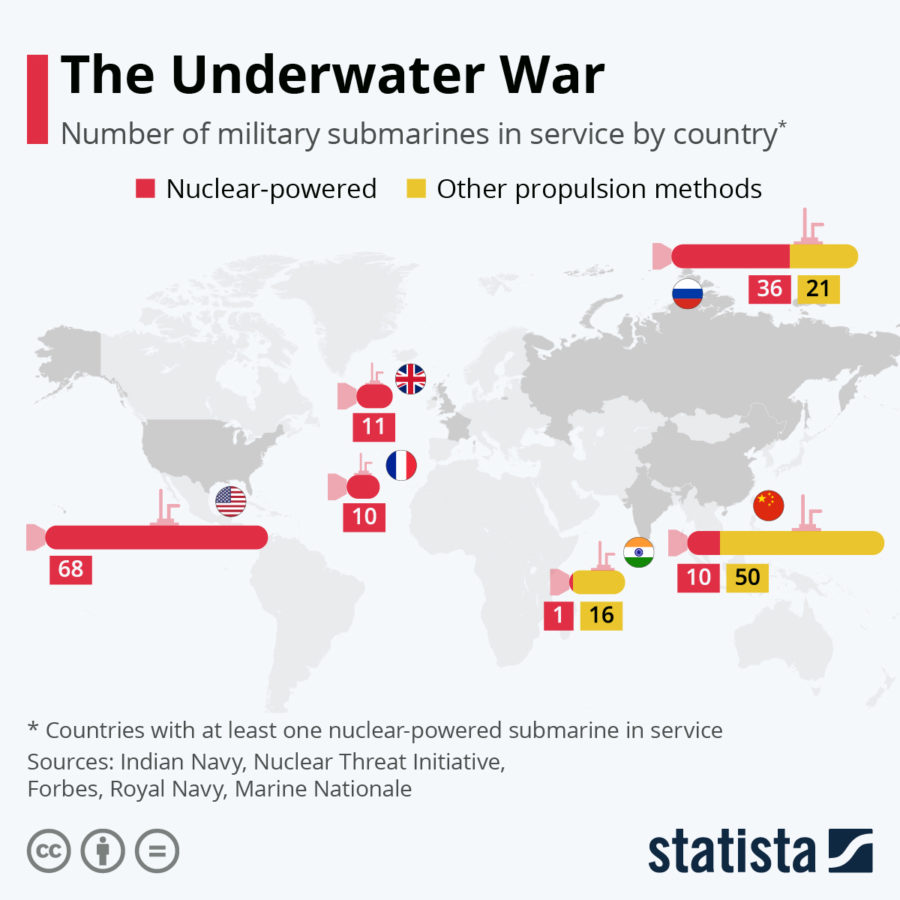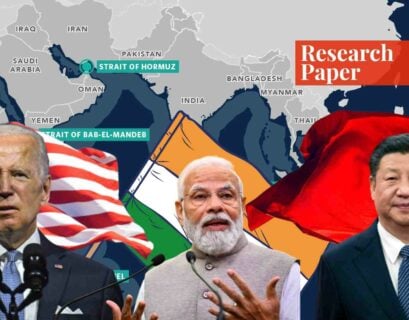Muhammad Aamir is a civil engineer currently enrolled in a master's program in political science at Bacha Khan University. He has a deep interest in international politics and contemporary affairs.
The AUKUS Pact
On 15th September 2021, AUKUS, a trilateral security pact was signed between Australia, the United States, and the United Kingdom. Under this pact, the US and the UK would help Australia in acquiring nuclear submarines along with technological transfer, a provision that makes the deal unique and the most talked about one. The US has, hitherto, transferred this technology to its most trusted ally, the UK. Not a single NATO member, except the UK, has enjoyed this privilege so far.
The deal would make Australia the seventh country in the world to have nuclear submarines along with the US, the UK, China, France, India, and Russia. Choosing Australia over any other state in the world clearly shows the US strategic policy shift from the Atlantic to the Asia Pacific, a region that will be the epicenter of global power struggle in the views of Robert Kaplan.

Prior to the AUKUS security pact, Australia had a deal with France worth $66 billion which France had termed as the “deal of the century” and under which France had to build 12 submarines for Australia. Just a day before the signing of the AUKUS pact, Australia had shown satisfaction with the progress being made by France.
Now that AUKUS has been made public, Australia altogether scrapped the deal with France and has left it empty-handed. The French foreign minister, Jean-Yves Le Drian, called AUKUS a “stab in the back”. AUKUS, besides antagonizing France, has some inherent weaknesses which might make it a futile one.
The Goal of the AUKUS Security Pact
Though the goals and motives behind AUKUS have not been declared publically by any of its signatories, analysts are of the opinion that the main target of the pact is the containment of rising China. The aim of the pact is to intimidate the Chinese ships and to disrupt its much-needed supply of hydrocarbons.
The pact can be seen as the extension of Obama’s “Pivot to Asia” and Donald Trump’s Indo-Pacific strategy, under the Biden Administration, both of which were to secure alliances in the regions with the like-minded states against China. Quad was the first link in the chains of US alliances. The US desperately wants to divert China’s attention from economy to military entanglements so that its increasing economic power can be curtailed.
Why Australia and the UK?
The US has always been very careful in choosing its allies whenever its strategic interest is at stake. Both Australia and the UK are longstanding US allies since World War I. The UK was the only country, till recently, to which Washington had transferred this nuclear technology. The importance of London can be gauged from the fact that even after Brexit, it still enjoys the strategic trust of Washington.
The role of the UK is unclear in the AUKUS security pact at the moment but it has still secured more strategic importance in the US policy circles than the whole EU. Similarly, Australia had already strained economic relations with China in the wake of the US-China trade war. The social and political similarities between Australia and the US also made them natural allies against a “revisionist” state.
The AUKUS Pact and France
France seems to have paid the price for its disobedience to the US in going tough against China and Russia which made Washington prefer its old accomplice, the UK, as a European leader. According to Zahid Mehmood Zahid, after Angela Merkel walked off the European political scene, Emanuel Macron was the region’s obvious leader but his leniency towards China and Russia placed him in the bad books of Washington.
Likewise, France has been very vocal against the rationale behind the reliance of the European Union for its security on the US and the purpose of still maintaining NATO as there is no apparent threat from the Cold War expansionist USSR. France is the proponent of creating strategic autonomy and an independent security arrangement for the European Union.
In reaction to the AUKUS pact, France went for a diplomatic boycott and summoned its ambassadors both from Washington and Canberra. Though the relations got restored, the damage has seemed to be done and the rift in the Trans-Atlantic alliance got exposed more than ever before. France also signed a €3 billion agreement with Greece which can be considered as a fledging step towards a strategically autonomous Europe.
China’s Response
China out rightly termed the agreement as “Cold War mentality” and that it will not serve anyone’s interest and will exacerbate the arms race in the region. The deal will definitely damage the supply of raw materials, like iron ore and coal, from Australia alongside scores of other products which both the states exchange with each other.
The bilateral trade between China and Australia amounted to $230 billion in 2020, according to the Australian Bureau of Statistics. China’s industries are heavily dependent on raw materials from Australia which will be a setback for Beijing.
Why the AUKUS Pact Might Fail
International politics has already witnessed a major shift from geopolitics to geo-economics; every state has now prioritized its economic interest which is the major driving force in the foreign policies of modern states. This, itself, contributes to the six reasons for the possible failure of the AUKUS security pact.
The strategy of containing China through military and security pacts has inherent loopholes and would not prove to be fruitful in achieving its aims and goals. In the case of AUKUS, the inability of the pact to achieve its goals can be attributed to the reasons mentioned hereafter.
- China’s Increasing Regional Partnerships
The AUKUS pact is being applied in the region which has the strongest and largest economic blocs in the form of the Association of Southeast Asian Nations (ASEAN), the Regional Comprehensive Economic Partnership (RCEP), and Comprehensive and Progressive Trans-Pacific Partnership (CPTPP). China has already replaced the US as the major trading partner of ASEAN. It has also formally requested to join CPTPP, the successor of US-led TPP (Trans-Pacific Partnership) which Donald Trump abandoned.
China is about to enact the largest economic partnership to date in the form of RCEP which clearly shows that the region is inclined towards China and that the US has lost its grip over it. Australia alone is unable to check the economic expansion of China in the region as China has already isolated it economically.
- The US’ Inability to Restrain China
Even with the already heavy military and naval presence of the US in the region, the Chinese expansion could not be effectively checked by the US. The addition of Australia in the equation will not make any major difference. With its economic clout, China has so far been able to secure its interests in the region.
Despite Japan and South Korea being the US’ allies, China is making inroads and is about to join them in CPTPP, which was kept alive by Japan and South Korea after the withdrawal of the US. The three states are also in advance talks about signing a free trade agreement among them. The Indo-Pacific Command of the US is draining billions of dollars from the US exchequer just to keep China at bay, still, China has been able to expand its trade volumes with its neighbors and beyond.
- China’s Strategy to Secure Markets and Routes
With its Belt and Road Initiative (BRI), China is about to overcome the security threat in the Indo-Pacific, including the Malacca dilemma, posed by the naval presence of the US, rendering all the US fleets and submarines useless. With the above-mentioned economic collaborations, China has already secured its major trading markets, and now with the BRI, it will be able to fortify its much-needed oil supplies. This clearly indicates that on one hand, China is trying hard not to confront the US and on the other hand, playing its economic card wisely to keep the dragon flying.
- Prioritizing Strategic Interests
By placing strategic interests over its economic one, Australia might be at the losing end of the bargain. China was the biggest export market for Australian goods and services. The trade was also heavily tilted in the favor of Australia with its exports worth $150 billion as compared to the $80 billion imports. After the China-Australia Free Trade Agreement of 2015, their bilateral trade grew at an unprecedented pace and still had a lot of potential to expand.
Now that Australia has joined a security pact that is apparently against China, Australia is about to lose its major exporting market. China is already looking for alternatives; Brazil can cater to its needs of iron ore. Similarly, Afghanistan could be helpful in providing coal to China once the security and political situations become certain in Kabul.
- The Timing of AUKUS
The US is not acting proactively rather, it has become a “late reactionary” in countering China. The timings of AUKUS do not make any sense because China has already moved to alternative trade routes. The China-Pakistan Economic Corridor, being the flagship project of BRI, is about to become operational which would provide China an easy, safe, and shortest route to access its Middle Eastern oil markets.
The nuclear submarines which Australia will acquire would be of no use once China moves completely to the land routes. In reaction to China’s BRI, the G-7, under the leadership of Washington, announced a utopian project – Build Back Better World (B3W) – which again shows that China is one step ahead because the US has yet to provide any framework or details about the project whereas, BRI has already had its concrete manifestation.
- The US’ Miscalculation
With its sole focus on the Indo-Pacific, Washington is providing too much space to China which the latter is occupying rapidly. When Donald Trump announced the withdrawal of the US from the TPP, China was there to replace it. When the US left Afghanistan in a haphazard manner, China became a proactive player in taking matters into its hands. Now that the AUKUS security pact has antagonized France and the focus of the US has shifted from the Atlantic to the Asia-Pacific, China might overreach the Europeans and take them under its economic clout.
Moreover, the US should have calculated the importance of the Indo-Pacific region for China more than anything else before surrounding it with useless security alliances. The whole Chinese industry relies on the energy which reaches China through these oceans. Around 70% of China’s oil passes through the Malacca Strait which makes this region profoundly important for China.
Washington could have found a partner in China for securing its free and open Indo-Pacific. Beijing would have happily helped Washington in mitigating any risk arising from pirates, natural hazards, or in any other form for which Washington is now paying heavily. But of course, this is not how international relations work and this is where the infamous Thucydides Trap becomes more relevant than ever before.
If you want to submit your articles and/or research papers, please check the Submissions page.
The views and opinions expressed in this article/paper are the author’s own and do not necessarily reflect the editorial position of Paradigm Shift.



















